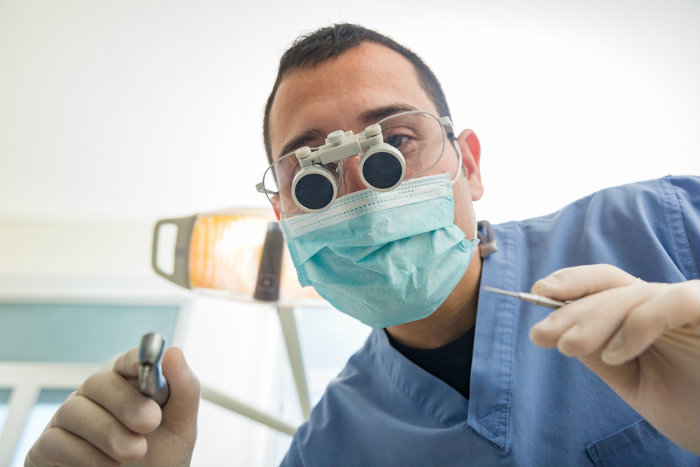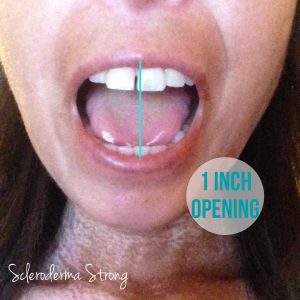Dental Hygiene Practices to Maintain a Healthy Mouth
Written by |

The very first step in the digestion process begins in the mouth. For someone with scleroderma, simply chewing food can be exhausting. Different disease factors affect one’s dental hygiene, but various steps can be taken to try to maintain a good environment within the oral cavity.
Over 20 percent of scleroderma patients have Sjogren’s syndrome. The disease is characterized by malfunctioning saliva and mucous glands, so essentially it leaves one with dry eyes and mouth, among other issues. A human can produce enough saliva in a lifetime to fill two swimming pools. There are special enzymes in our saliva that help to break down the composition of food, and without them, things can get complicated.
Biotene is a common mouth rinse used by many patients to combat dry mouth. Xylamelt tablets also are used.
The tightening caused by scleroderma can shrink the opening of one’s mouth to a point in which even biting a sandwich becomes difficult. The reality is hard to face, as sandwiches get cut into fours and eaten with a fork. There’s something satisfying about taking a big bite of a delicious sandwich or burger, and that is lacking with scleroderma.
Since there’s less room in the mouth, little pieces of food become stuck inside the cheeks. These food particles will turn into plaque if they stay lodged in the teeth too long, so rinsing after every meal is a must. Smaller bites of food must be taken, which results in lengthy eating times. Anytime I’m eating with a group of people, I am always the last one left, finishing almost 30 minutes after everyone else is done. It can make one feel self-conscious, but those around should understand with an open heart and wait patiently.
A small mouth also makes dentist visits dreadful, but regularly scheduled teeth cleanings can prevent and maintain a healthy mouth. Fear of the dentist must be overcome to proceed with this maintenance. An appointment can be scheduled with a pediatric dentist because they have smaller tools to reach the back of the mouth.
Vaseline placed around the corners of one’s mouth can help ease the opening and prevent minor cuts or tears. It’s important to always ask for a gentle cleaning, since receding gum lines are also very common. This is due to the face being so tight, as it begins to pull the gums downward. This recession is very hard to reverse, and can sometimes be treated with a gum graft. Some patients can, unfortunately, lose teeth from the combination of all the above complications.
Following are a few items that can help keep those pearly whites in shape:
- Electric toothbrush: a child- or adult-sized toothbrush can help significantly reduce plaque.
- Waterpick: helps to gently clean food that gets stuck in between teeth.
- Floss picks: scrapes and picks between teeth.
- Mouthwash: helps prevent plaque buildup.
- Flouride toothpaste (prescription from a dentist): helps keep teeth strong.
When good dental practices are added to our daily routines, it can lessen the discomfort between dentist visits. Our teeth are the livelihood of our bodies and must be maintained, similar to a car. Investing in these products creates one less worry on this chronic journey.
***
Note: Scleroderma News is strictly a news and information website about the disease. It does not provide medical advice, diagnosis, or treatment. This content is not intended to be a substitute for professional medical advice, diagnosis, or treatment. Always seek the advice of your physician or other qualified health provider with any questions you may have regarding a medical condition. Never disregard professional medical advice or delay in seeking it because of something you have read on this website. The opinions expressed in this column are not those of Scleroderma News or its parent company, Bionews Services, and are intended to spark discussion about issues pertaining to scleroderma.









Al Krieger
Wonderful, educational article except at the tail end: Fluoride is a neurotoxin... the last thing people with weakened Immune Systems need!
"Who would have thought that it ever would have happened? Someone in mainstream medicine and peer reviewed literature and journals would publish the ‘unthinkable’: fluoride, the stuff they put into municipal water supplies supposedly to ‘protect’ teeth from cavities, is a neurotoxin. Wow! And congratulations to doctors Philippe Grandjean, MD, and Philip J Landrigan, MD, two researchers who published their findings in The Lancet Neurology, Volume 13, Issue 3, Pages 330 to 338, March 2014." Additional credible sources easily available